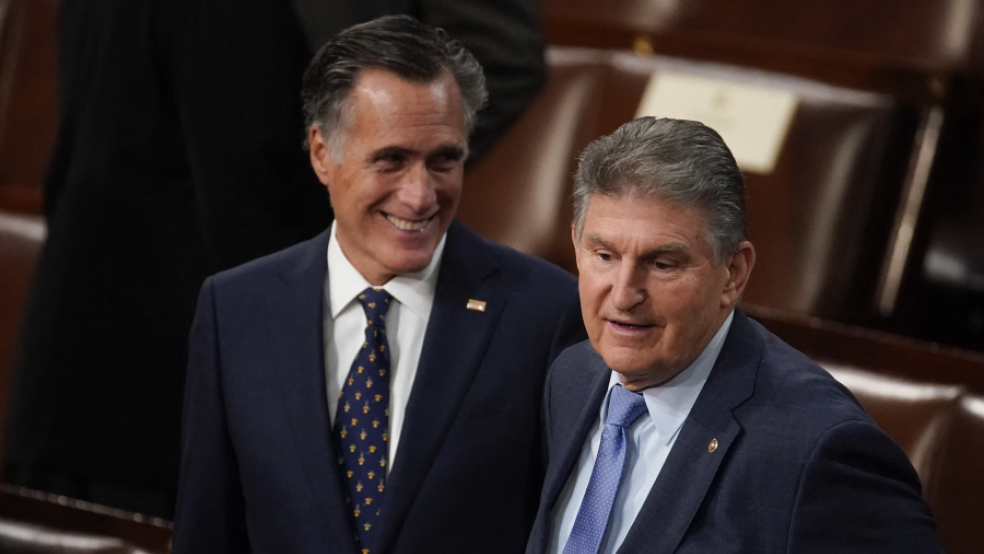Sens. Mitt Romney of Utah and Joe Manchin of West Virginia introduced a bill Thursday that would create a commission tasked with stabilizing the national debt.
Warning that the nation’s finances are “not in order,” Manchin said the bill would address the “unsustainable path” of the country’s debt. “I am proud to introduce this commonsense legislation with my friend and colleague Senator Romney that would create a bipartisan, bicameral fiscal commission to identify comprehensive solutions to bring us back to a sustainable fiscal outlook.”
The details: The bill, called the Fiscal Stability Act, would establish a 16-member commission made up of 12 lawmakers and four outside experts. The commission would be required to produce a report by May 1, 2025, that proposes new legislation outlining specific steps for policymakers to take, with the goal of stabilizing the ratio of public debt to GDP within 15 years and improving the solvency of federal trust funds over a 75-year period. If the commission’s work is approved, the proposed legislation would receive “expedited consideration” in the House and the Senate.
The bill is backed by a group of senators including Republicans John Cornyn of Texas, Todd Young of Indiana, Cynthia Lummis of Wyoming and Thom Tillis of North Carolina; Democrats John Hickenlooper of Colorado, Mark Warner of Virginia and Jeanne Shaheen of New Hampshire; and independent Kyrsten Sinema of Arizona.
The legislation is matched in the House by the Fiscal Commission Act, which was introduced in September by Reps. Bill Huizinga, a Republican from Michigan, and Scott Peters, a Democrat from California.
Asked if the new plan is simply a replay of the Simpson-Bowles commission — the ill-fated effort to stabilize the debt in 2010 — Romney told CNBC that while the plan for the new debt commission is similar to Simpson-Bowles, conditions have changed in the meantime. “The debt is now twice the level that it was,” creating more urgency for lawmakers, he said, adding that the new commission also has a well-defined process for getting any proposed legislation to Congress for a vote, unlike the previous effort.
Romney also pushed back against the idea that a debt commission necessarily means cuts to popular programs like Social Security. “The reality is not everything is on the table because neither one of us and nobody else is talking about changing our entitlements for retirees or people nearing retirement,” Romney said. At the same time, reductions for younger people who are still years away from retirement would likely be fair game.
Battle lines are drawn: The advocacy group Social Security Works put out a statement signed by dozens of labor and progressive groups saying they are “in strong opposition to the formation of a debt commission which has been promoted during the ongoing debate around government funding.” The group added that the “White House has accurately described such a commission as a ‘death panel’ for Social Security.”
The group said that Congress can address debt directly, without the need for a special commission, and in any event, Social Security should be left out of the discussion since “the program is totally self-funded, cannot pay benefits or associated costs without the revenue to cover the costs, has no borrowing authority, and, therefore, does not add a penny to the deficit.”
At the other end of the political spectrum, fiscal conservatives were delighted with the proposal. “[A] commission is likely our best hope to tackle America’s immense challenges,” the Committee for a Responsible Federal Budget said in a statement. “A commission can help policymakers build upon recent fiscal successes to show we can govern and make hard choices.”




